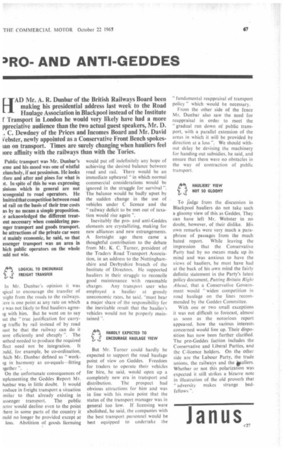2 R0.AND ANTI-GEDDES [I AD Mr. A. R. Dunbar of the
Page 69

If you've noticed an error in this article please click here to report it so we can fix it.
British Railways Board been making his presidential address last week to the Road Haulage Association in Blackpool instead of the Institute I Transport in London he would very likely have had a more ppreciative audience than the two actual guest speakers, Mr. D. . C. Dewdney of the Prices and Incomes Board and Mr. David Vebster, newly appointed as a Conservative Front Bench spokestan on transport. Times are surely changing when hauliers feel tore affinity with the railways than with the Tories.
Public transport was Mr. Dunbar's lone and his mood was one of wistful elancholy, if not pessimism. He looks !fore and after and pines for what is A. In spite of this he was expressing gnions which in general are not 'congenial to road operators. He Imitted that competition between road id rail on the basis of their true costs as by no means a simple proposition. e acknowledged the different treateat necessary when considering passger transport and goods transport. he attractions of the private car were A mainly economic, he said, so that issenger transport was an area in hich public operators on the whole mild not win.
LOGICAL TO ENCOURAGE fl FREIGHT TRANSFER
In Mr. Dunbar's opinion it was igical to encourage the transfer of eight from the roads to the railways. ,ere is one point at any rate on which a was not likely to find hauliers agreeig with him. But he went on to say tat the " true justification for carryig traffic by rail instead of by road lust be that the railway can do it tore efficiently and cheaply ". The tethod needed to produce the required Ffect need not be integration. It Duld, for example, be co-ordination, .hich Mr. Dunbar defined as " workig in harmony as co-equals—fitting )gether ". .
On the unfortunate consequences of nplementing the Geddes Report Mr. )unbar was in little doubt. It would roduce in freight transport a situation milar to that already existing in assenger transport. The public !ctor would decline even to the point there in some parts of the country it ould no longer be provided except at loss. Abolition of goods licensing
would put off indefinitely any hope of achieving the desired balance between road and rail. There would be an immediate upheaval "in which normal commercial considerations would be ignored in the struggle for survival ". The balance would be badly upset by the sudden change in the use of vehicles under C licence and the "railway deficit to be met out of taxation would rise again ".
Inevitably the proand anti-Geddes elements are crystallizing, making for new alliances and new estrangements. A fortnight ago there came a thoughtful contribution to the debate from Mr. K. C, Turner, president of the Traders Road Transport Association, in an address to the Nottinghamshire and Derbyshire branch of the Institute of Directors. He supported hauliers in their struggle to reconcile good maintenance with reasonable
charges. Any transport user who employed a haulier at grossly uneconomic rates, he said. "must bear a major share of the responsibility for the inevitable result that the haulier's vehicles would not he properly maintained ".
HARDLY EXPECTED TO ENCOURAGE HAULAGE VIEW
But Mr. Turner could hardly be expected to support the road haulage point of view on Geddes. Freedom for traders to operate their vehicles for hire, he said, would open up a completely new era in transport and distribution. The prospect had obvious attractions for him and was in line with his main point that the status of the transport manager was in general too low. If licensing were abolished, he said, the companies with the best transport personnel would be best equipped to undertake the
" fundamental reappraisal of transport policy" which • would be necessary.
From the other side of the fence Mr. Dunbar also saw the need for reappraisal in order to meet the "gradual run down of public transport, with a parallel extension of the areas in which it will be provided by direction at a loss ". We should without delay be devising the machinery for handing out subsidies, he said, and ensure that there were no obstacles in the way of contraction of public transport.
HAULIERS VIEW NOT SO GLOOMY
TO fudge from the discussion in Blackpool hauliers do not take such a gloomy view of this as Geddes. They can have left Mr. Webster in no doubt, however, of their dislike. His own remarks were very much a paraphrase of passages from the much hated report. While leaving the impression that the Conservative Party had by no means made up its mind and was anxious to have the views of hauliers, he must have had at the back of his own mind the fairly definite statement in the Party's latest policy document, Putting Britain Right Ahead, that a Conservative Government would "widen competition in road haulage on the lines recommended by the Geddes Committee.
With one or two small exceptions it was not difficult to forecast, almost as soon as the notorious report appeared. how the various interests concerned would line up. Their disposition has now been further clarified. The pro-Geddes faction includes the Conservative and Liberal Parties, and the C-licence holders. On the other side are the Labour Party, the trade unions, the railways and the ouliers. Whether or not this polarization was expected it still strikes a bizarre note in illustration of the old proverb that "adversity makes strange bedfellows ".
Janus
















































































































